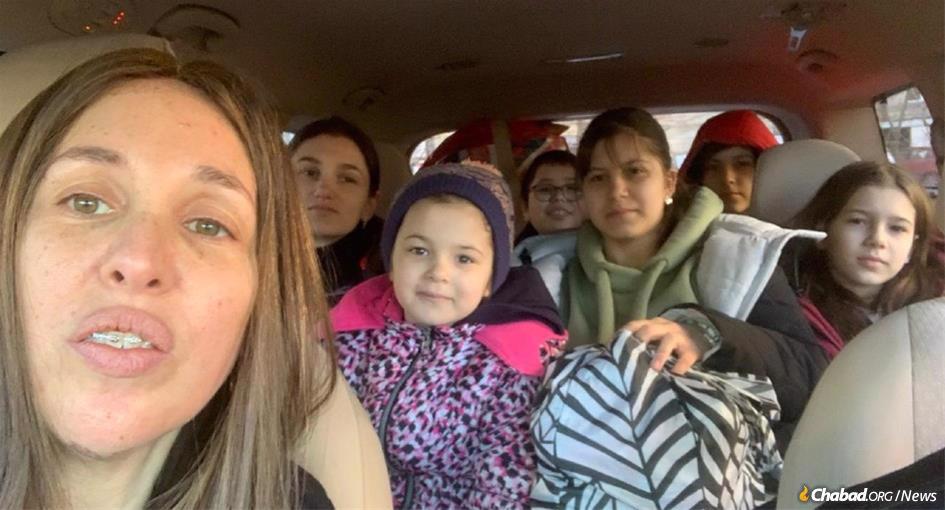Growing up in the early 1990s in Kiev, capital of the newly independent Ukraine, Esther Koronskaya didn’t celebrate Passover. Seventy years of Communist repression had done its job on her family, and the Jewish traditions of their ancestors had been all but forgotten.
Now 34 years old and in Israel for a little more than a month, she is preparing to celebrate the Festival of Freedom in a seminary-turned-resort together with fellow members of Chabad-Lubavitch’s Simcha Community in eastern Kiev. From the first days of the war in Ukraine, Simcha, which is led by Rabbi Mordechai and Devora Levenharts, has shepherded dozens of its community members out of war-torn Ukraine and on to Israel, Koronskaya among them.
For Koronskaya and the thousands of Ukrainian refugees now in Israel, the narrative of the Exodus—in which G‑d whisked the Jewish people’s ancestors out of slavery and oppression—will ring especially true when they celebrate the Passover Seder this year on Friday, April 15.
It’s a lonely and frightening time for these refugees, many of them women and children who left behind male family members in Ukraine. But Chabad-Lubavitch emissaries from Ukraine—some of whom themselves left the country with just a few bare necessities—have scrambled to cater to the needs of their constituents, both those in Ukraine, as well as those in Europe and Israel.
“The Levenhartses took me and my children to Moldova in their own car since the buses had filled up,” Koronskaya, a nurse, tells Chabad.org. “They helped us a lot, supported us morally and financially in our trip to Israel, and now assist us here literally in everything: documents, school and finding our way in a new country.”
Koronskaya says that last year, she joined the community for Passover in Haditch, a small Ukrainian town where Rabbi Schneur Zalman of Liadi, the founder of the Chabad-Lubavitch movement, is buried.
When the war began, Koronskaya started sleeping with her children in the basement and spending the days in a nearby shelter, expecting the violence to be over in a matter of days. “When roadblocks were set up in the city and a curfew was introduced,” she continues, “it became clear that this would not end quickly.”
Yet even as she is settling into her new home in Nof Hagalil, in Israel’s north, she says she worries about her family and friends she left behind, praying that they will be safe and will have their basic needs met.

Securing a Variety of Venues for the Seder
The emissaries from Ukraine, joined by central Chabad organizations like the Federation of Jewish Communities and Colel Chabad, are working around the clock to meet the needs of the refugees. Some Chabad emissaries are arranging communal Seders for whoever wishes to join, and others are sending Seder-to-go kits to those who want to remain in the housing they have just settled into.
This has all been made possible thanks, in a large part, to the generosity of the Jewish community worldwide. “In this moment of devastation and displacement for so many, it’s particularly important that the Jews of Ukraine be able to experience Passover – and feel the warm embrace of the global Jewish community," said Eric Goldstein, CEO of UJA Federation of New York, which is one of the organizations supporting this effort. "We are immensely grateful to our partners for helping to source and distribute Passover food and organize communal seders for tens of thousands of Jews in Ukraine and neighboring countries.”
Some of the Ukrainian Jewish communities now in Israel are planning to be together in a single kosher-for-Passover facility, where they will sing, celebrate, pray and encourage each other for the weeklong holiday.
But where does one find an empty hotel on just a few weeks’ notice? Some are using yeshivahs, virtually all of which are on Passover break, and have ample dorm rooms, dining halls, synagogues and commercial kitchens to accommodate the refugees for all or part of the week-long holiday.
Koronskaya will join together with members of her eastern Kiev community in the Beit Chana Seminary building in Tzfat, the mystical city nestled in the olive-covered hills of the Galilee.
The reconstituted remnants of Kedem, another Kiev community, composed mostly of people who had fled Donetsk in 2014, will be spending Passover in Kfar Citrin, where they will be joined by refugees from Kharkiv, a city that has seen intense shelling in recent weeks.
For the children of the Chabad’s Alumim Children’s Home in Zhytomyr, which arrived in Israel on March 6, Passover will present its own unique challenges: It is at its heart a family holiday, and the Seder is structured to be a family experience, with elders responding to the questions of their offspring.
To create a memorable experience for the children, who are now in Nes Harim, Chabad refugee families from Ukraine will be joining the orphanage for the holiday. For the Seder night, each one will “adopt” several children, who will become part of their family unit for the evening.
And during the intermediate days, the children will be taken on day trips to various attractions, giving them a welcome respite from the stresses of the past six weeks.
“This all happened so fast,” says Devora Levenharts. “Two months ago, we had completely different plans for Passover in Ukraine. We literally did not have a chance to catch our breath, but there is no doubt that even this year we will be celebrating together as a community.”
The Ukraine Jewish Relief Fund has been established to help provide assistance to the Jewish communities in Ukraine impacted by the war.
Click here for a prayer you can say and a list of good deeds you can do in the merit of the protection of all those in harm’s way.









Start a Discussion